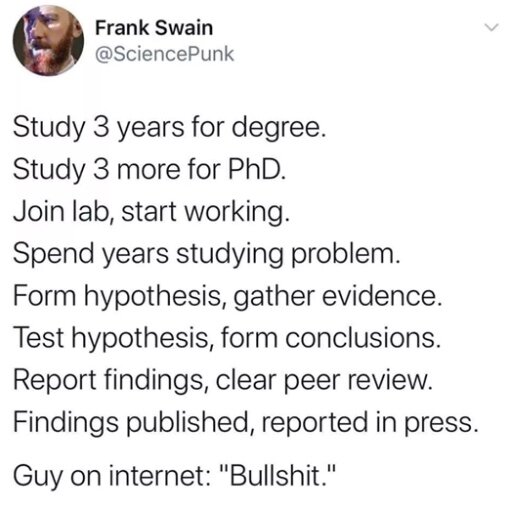#34 - The Great Divide of Baby Sleep
This Blog is not so much about sleep as it is about science.
In April 2020, there was a day in the media where the focus was on Greece.
Why?
Because their Chief Medical Officer - Professor Sotiris Tsiodras - was the most popular man in Greece.
Why?
Because every night - at 6pm - he would go on TV and inform Greece of their current COVID-19 statistics. But also because he was looking at the evidence for what would slow down the infection rate of the virus and applying it to Greek’s society.
This week, one has to only look at the USA to see the complete opposite - what happens when a person does not apply science to real-life situations.
This headline and graphic should say it al:
This week, a video of a doctor touting a treatment for COVID-19 - that did not have scientific evidence to support it - went viral - and Donald Trump thought she was ‘impressive’.
Yet, the USA has an outstanding scientist as their go-to-person to deal with this crisis - Dr Anthony S. Fauci.
We know this not just because we hear it in the media, but by searching for the facts.
For example, there are databases that show how much people have published scientific papers. One is called Scopus. And Scopus shows that … well, my publication data is pretty good - but it’s nothing compared to Dr Fauci’s.
Professor Fauci has published over 1,100 scientific papers - a feat that is rare for the majority of scientists around the world.
Aside from teaching my students, I also teach my clients - as well as my own kids - the importance of applying scientific evidence to our lives.
But I learned in the past decade that there are many people who do not.
My wife sent me this post from Facebook this week. It has been true for me - as it has for many scientists.
Baby Sleep
I thought when I undertook a study to see if sleep training causes severe stress that leads to further attachment, emotional and behavioural issues that I would be doing the world a favour.
I learned along the way that there were:
people who didn’t need a research study to prove sleep training was stressful and damaging - because it was obvious.
people who reported second-hand facts - that there were studies to prove sleep training (human) babies was damaging (eg, rat pups who were separated from their mums for one week showed ill effects; as well as children in Romanian orphanages)
people who didn’t believe the results when they came out (because someone they know had a bad experience).
people who didn’t agree with the results of our study because it didn’t align with the beliefs of the mother’s group they were in (and btw - I was a male so I could never understand … that’s actually true … I am a man and I don’t need a study to prove that).
I knew when the journal Pediatrics wanted to do a press release of my study that the shit was going to hit the fan - to be more accurate, non-fans would want to fling shit at me.
But I knew that this was a divisive topic - meaning there were so many mums out there who didn’t want to do sleep training because they needed to know it wasn’t going to harm their baby. That’s the only reason I felt compelled to do the myriad of interviews that were asked of me.
So a message could be told to those mums stuck between a … better night’s sleep and shit-flingers -
This experience that has lasted over a decade has shown me that whilst I believe in applying science to my life, there are many people who do not (or perhaps to be more accurate, they cherry pick what science they apply to their life - eg, if they get sick, they go to a doctor, and get medicine to make them feel better).
This has also led me to consider a burning question.
Can one’s scientific literacy predict whether they will go through with sleep training?
Yes, I hear you. It might not just be scientific literacy, but other factors could be at play.
But science is about looking at one thing at a time. And scientific literacy is important - it affects people’s lives.
At least my science wasn’t a matter of life or death (if you forget about the death threat I received).
But at least those of us - who help people sleep better - know that it’s a dream job (mind the pun).
Prof Mike Gradisar







